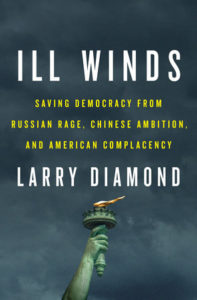 In his essay “Democracy Demotion” (July/August 2019), Larry Diamond claims that Hungarian Prime Minister Viktor Orban “has presided over the first death of a democracy in an EU member state,” notes Zoltan Kovacs, Orban’s State Secretary for International Communication. Diamond and other critics of Orban who assert that Hungary is no longer a democracy rely on a set of flawed arguments, he writes for Foreign Affairs:
In his essay “Democracy Demotion” (July/August 2019), Larry Diamond claims that Hungarian Prime Minister Viktor Orban “has presided over the first death of a democracy in an EU member state,” notes Zoltan Kovacs, Orban’s State Secretary for International Communication. Diamond and other critics of Orban who assert that Hungary is no longer a democracy rely on a set of flawed arguments, he writes for Foreign Affairs:
For example, voter participation in Hungary has been going up, not down. Last year’s parliamentary elections saw the highest turnout since 2002. In elections for the European Parliament this past May, Hungarians again showed up in record numbers to vote, and a party barely two years old won ten percent of the vote. The surge in emigration that followed the 2008 financial crisis has subsided, and far more Hungarians are now returning than are leaving.
 But the test of a democracy is whether people can choose and replace their leaders in free and fair elections. This is the test that Hungary’s political system now fails, argues Diamond, author of Ill Winds: Saving Democracy from Russian Rage, Chinese Ambition, and American Complacency. When Orban and his Fidesz party returned to power in 2010 with a parliamentary supermajority, they set about destroying the constitutional pillars of liberal democracy, he notes:
But the test of a democracy is whether people can choose and replace their leaders in free and fair elections. This is the test that Hungary’s political system now fails, argues Diamond, author of Ill Winds: Saving Democracy from Russian Rage, Chinese Ambition, and American Complacency. When Orban and his Fidesz party returned to power in 2010 with a parliamentary supermajority, they set about destroying the constitutional pillars of liberal democracy, he notes:
- First, Orban packed Hungary’s Constitutional Court with political loyalists. He did the same with the National Election Commission and the Media Council, a newly created watchdog group.
- Fidesz then rammed an entirely new constitution through parliament, clipping the authority of the Constitutional Court and politicizing the judiciary more broadly and extending party control over such crucial accountability agencies as the State Audit Office and the central bank.
- Orban also purged state-owned radio and television stations and made them mouthpieces to justify his creeping authoritarianism. He pressured critical media outlets, which saw their advertising revenues plunge, and harassed civil society organizations that received international assistance.
By the 2014 elections, Orban had rigged the system and transformed Hungary into not an illiberal democracy but a pseudo-democracy, states Diamond, co-director of the NED’s International Forum for Democratic Studies and co-editor of The Journal of Democracy. RTWT







